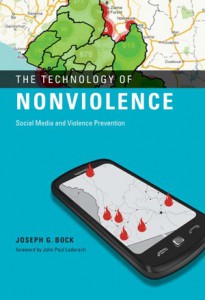
Joseph G. Bock
5.0 out of 5 stars Pioneering Work, Deserves a Great Deal of Attention, April 29, 2013
I am shocked that there are no reviews of this book. Brought to my attention by Berto Jongman, one of the top researchers in Europe with a special talent at the intersection of terrorism and related violence (e.g. genocide) and Open Source Intelligence (OSINT), he knew this is an area that is of very high interest to me.
The book passed my very first test, with more than ample references to Dr. Patrick Meier, a pioneer in crisis mapping, SMS translations and plotting by diasporas, and humanitarian ICT generally. I strongly recommend his blog and expect him to produce a book of his own soon.
The primary focus here is on social media via hand-held devices. It assumes a working Internet and does not have a great deal of focus on the urgency of achieving an Autonomous Internet, and more fully exploiting Liberation Technology and Open Source Everything (OSE), the latter my special interest along with M4IS2 (Multinational, Multiagency, Multidisciplinary, Multidomain Information-Sharing and Sense-Making).
Use Inside the Book to see the chapters and appendices. The author makes clear two major points early on:
01 Grassroots is where its at, not top down macro
02 Technology alone is not enough, organizing — the hard long road of grassroots organizing — is essential.
I am charmed by this focus, having been saying for the past 20 years that technology is not a substitute for thinking (but Western intelligence communities pretend that it is and end up being worthless at anything useful like reducing poverty or itemizing the true costs of our mostly insane production and consumption habits).
This is a good book. It deserves to read, and it should certainly be in every library having anything to do with creating a prosperous world at peace, a world that works for all.
Although the book does a fine job of discussing field collection, and it certainly recognizes the extensive contributions of Crisis Mappers and Dr. Patrick Meier and others in those circles, it avoids two issues that I feel compelled to mention for balance, but in no way does their absence reduce the value of the book.
01 CORRUPTION — in the West as well as in the recipient countries — is Public Enemy #1. No campaign, no technology plan, can be crafted without clearly mapping and planning for the corruption that causes scarcity and leads to violence.
02 DECISION-SUPPORT — tailored information processed, analyzed, visualized, and SHARED — is the other half of the picture, and that includes a requirement that a strategic analytic model be in place, as well as an M4IS2 Centre and a process for insuring that all data about corruption and all data about each of the threats and policies (especially water, food, medicine, and energy) are in the public domain. Public intelligence in the public interest is “root.”
Here are ten other books I recommend along with this one:
Exploring of Wireless Technology to Provide Information Sharing Among Military, United Nations and Civilian Organizations During Complex Humanitarian Emergencies and Peacekeeping Operations
Field Level Information Collaboration During Complex Humanitarian Emergencies and Peace Operations.
Wireless Sensor and Actuator Networks: Technologies, Analysis and Design
Peacekeeping and Public Information: Caught in the Crossfire
Information Campaigns for Peace Operations
Introduction to Private and Public Intelligence: The Swedish School of Competitive Intelligence
Teaching With the Tools Kids Really Use: Learning With Web and Mobile Technologies
Social Media, Crisis Communication, and Emergency Management: Leveraging Web 2.0 Technologies
Integrated Peacebuilding: Innovative Approaches to Transforming Conflict
Crowdsourcing Geographic Knowledge: Volunteered Geographic Information (VGI) in Theory and Practice
The World Brain and Global Game are emergent….I keep hoping someone like Sir Richard Branson might spring for my idea (The Virgin Truth 2.6) but so far, no joy. Nor does the Secretary General of the United Nations get his mail, my last proposal was staffed to the DSS and has been buried. Someone, somewhere, needs to energize this field — we need to go BEYOND crisis mapping and disaster uses, and make these technologies a staple of everyday life in which every citizen has access to all relevant information on every policy and budget matter, and both voice and vote.
Best wishes to all,
Robert David STEELE Vivas, contributing editor to
PEACEKEEPING INTELLIGENCE: Emerging Concepts for the Future




